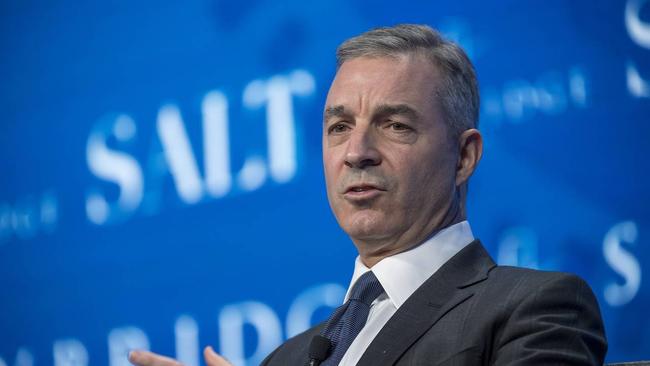Activist investor Daniel Loeb sees roughly $US1 trillion of untapped value in Amazon
Third Point’s Daniel Loeb told investors on a private call that the market is underestimating the potential of the tech giant’s two key businesses.

Activist investor Daniel Loeb, whose Third Point counts Amazon.com as one of its biggest holdings, told investors on Wednesday that he sees roughly $US1 ($A1.39) trillion in untapped value at the e-commerce giant.
Mr Loeb said on a private call with the hedge fund’s investors that the market is failing to recognise the full value of Amazon’s two disparate businesses, its core e-commerce operation and its Amazon Web Services cloud unit, according to people familiar with the matter. The call reviewed Third Point’s 2021 performance and its outlook on markets and a number of stocks were discussed.
AWS, as Amazon Web Services is known, has a so-called enterprise value of more than $US1.5 trillion, almost as much as the company’s current market value of $US1.6 trillion, according to a slide shared on the call, the people said. Meanwhile, Amazon’s retail business could be worth some $US1 trillion, the slide said.
There is no sign that Mr Loeb, one of the best-known shareholder activists, is pursuing an activist campaign at Amazon. The basic sum-of-the-parts analysis of Amazon has been widely discussed in recent years on Wall Street – especially since antitrust regulators began zeroing in on the increasing power of large tech companies like Amazon, fuelling talk of potential break ups.
Third Point as of the end of the year had an Amazon stake valued at $US784m, according to a filing earlier this week. The fund had a stake of roughly $US608m three months earlier and was boosted by additional share purchases by Third Point.
Mr Loeb referenced the Amazon position in his fourth-quarter investor letter released Thursday after The Wall Street Journal’s report on the call. He wrote that the increased position references “our conviction that Amazon is at an important crossroads as new management considers its long-term strategic plan to move the company forward, which may include several bold initiatives that are the subject of wide market speculation at the proverbial investor water cooler.” He said he was encouraged by two recent developments: that the company repurchased shares for the first time in a decade in January, and that the company has disclosed more detailed financial results, including breaking out advertising revenue and detailing capital expenditures by category.
Third Point has shared with other hedge funds in recent weeks why it thinks a spin-off of AWS could make sense, including that it could help ease regulators’ concerns about the company’s market power, according to people familiar with the matter.
Though AWS accounts for less than 13 per cent of the Seattle tech giant’s revenue, it is considered Amazon’s cash cow.
While best known for its retail platform, Amazon was a pioneer in cloud computing. Amazon launched AWS in 2006 and had a year-long head start on competition before companies like Microsoft Corp. and Google began offering rival services. Today, AWS ranks as the world’s largest cloud provider, according to research firm Gartner. If spun off, it would rank among the largest technology companies in the world. AWS was run by Andy Jassy until July, when he replaced founder Jeff Bezos as Amazon CEO.
Amazon has been the focus of an investigation by Congress on the monopoly power of technology platforms including Apple, Google parent Alphabet and Facebook parent Meta Platforms Inc. After a 16-month investigation, House lawmakers proposed legislation including a bill that seeks to make Amazon and other large corporations effectively split in two or shed their lines of private-label products. For Amazon, that could mean separating its private brands and devices such as Echo speakers from its online marketplace.
In its current form of disparate businesses, Amazon is one of the last true conglomerates. It has business lines as diverse as advertising, movie production, book publishing and cloud computing. As a result, it is the US’s second-largest private employer.
The company has historically baulked at calls for it to break up and has said “fringe notions on antitrust would destroy small businesses and hurt consumers.” Amazon’s stock price soared 76 per cent in 2020, benefiting from lockdowns driven by Covid-19. As people avoided stores, more turned to online shopping, with Amazon being one of the biggest beneficiaries. But in 2021, its share price climbed just 2.4 per cent, compared with the S&P 500’s total return of 28.7 per cent. In its most recent quarter, Amazon’s overall growth slowed while AWS’s revenues rose nearly 39 per cent from the year-earlier period.
The Wall Street Journal


